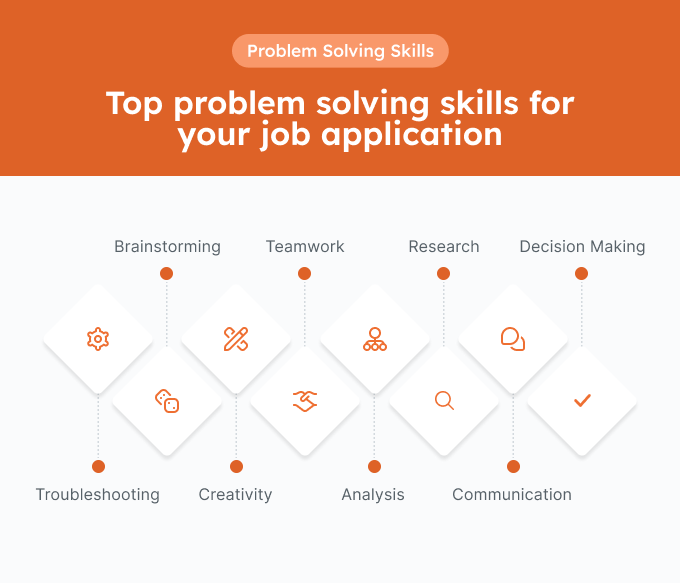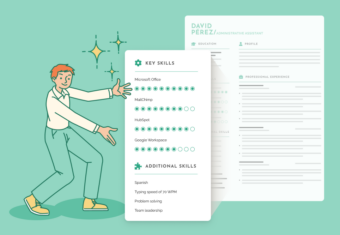What are problem solving skills and why are they important?
Problem solving skills are transferable skills that help you identify, assess, and resolve issues effectively. Whether you’re responding to a customer complaint or looking for ways to reduce company expenses, solid problem solving skills are important for doing your job well.
Problem solving skills examples
Here’s a list of the top skills you need to develop to become a competent problem solver:
Troubleshooting
Troubleshooting is a type of technical problem solving skill that involves identifying the root cause of a technical issue and developing a plan to solve it.
If you’re pursuing a career in IT, engineering, or telecommunications, highlight your troubleshooting skills when you make your best resume to convince hiring managers that you have the technical skills required to problem solve efficiently at work.
Creativity
Creativity isn’t just a soft skill that’s valuable for artists and graphic designers.
Business leaders acknowledge that creativity is a valuable skill to have for workers in any industry, because it facilitates innovation and problem solving. Creative thinking helps you approach issues from new angles, making it a useful problem solving skill.
Teamwork
In the workplace (and in life) you’ll frequently encounter issues that you can’t solve by yourself.
Knowing how to go to other people for help and work as a team is an essential problem solving skill. So if your target role requires problem solving abilities, highlight your teamwork skills when writing your resume. Effective teamwork requires the ability to recognize the strengths and weaknesses of each team member, and learning how to work together in a way that plays to everyone’s strengths.
Developing your teamwork skills will ensure that the collective problem solving process proceeds smoothly.
Brainstorming
There are usually several different ways to solve a single issue.
Brainstorming ideas, either on your own or with your colleagues, is a good way to come up with different potential solutions, making it an important skill related to problem solving.
Some examples of brainstorming techniques include:
- Mind mapping
- Rapid ideation
- Storyboarding
- Brainwriting
Analysis
Analytical skills are similar to critical thinking skills in that both help you process information to make informed decisions.
However, while critical thinking can be applied in a wide variety of contexts, analytical skills are specifically related to analyzing data.
Having strong analytical skills will help you interpret and organize data, making them a great form of problem solving skills for job seekers in fields like accounting, data analysis, and marketing analysis.
Research
One of the first steps to solving a problem is finding out why it happened.
That’s why research is an essential problem solving skill. If you’re good at research, you can identify where a problem came from, why it occurred, and find some ideas for how to prevent it happening in the future.
The ability to organize your search efforts and locate trustworthy sources of information is key to becoming an efficient problem solver.
Communication
When solving problems at work, communication skills are essential. If you’re unable to communicate your ideas clearly, it’ll be difficult to convey to managers why your proposed solution to a problem will be effective.
And if it’s a team effort, you need to be able to get your point across for the collaboration to work.
Develop both your written and verbal communication skills to ensure you can make yourself understood in any situation.
Decision making
After you’ve determined the scope, cause, and potential solutions to a problem, you need to decide which solution will deliver the best results.
If you can’t make well-informed decisions regarding the next steps of the problem solving process you’re not going to be able to solve it effectively, even if you understand the different elements of the problem itself.
If you’re applying for a management role, highlight decision making and other conceptual skills like logical thinking and strategic planning on your resume to show employers you have the skills necessary to succeed in the role.
How to improve your problem solving skills
Want to get better at problem solving? Here are three ways to develop strong problem solving skills:
1. Get outside of your comfort zone
Opportunities for problem solving often occur when we challenge ourselves and try something new.
Take a course at your local university, volunteer for a good cause in your area, or get involved in a new project at work for opportunities to apply your problem solving skills.
2. Learn from your mistakes
Try not to feel defeated if your efforts to solve an issue don’t immediately succeed, or if the outcome isn’t what you expected.
Instead, examine what went wrong and how you can avoid making the same mistake again. This will allow you to make steady progress in developing your problem solving skills.
3. Ask for feedback
Listening to feedback from coworkers with more advanced problem solving skills than yourself is one of the most effective ways of learning new problem solving methods.
If it turns out that your solution isn’t as effective as you would have liked, don’t be afraid to acknowledge your limitations and ask for your colleagues’ input. Hopefully, they’ll be able to point out what you could’ve done differently to achieve a better outcome.
How to demonstrate your problem solving skills to employers
Now that you know what problem solving skills are and how to develop them, here’s how to demonstrate your problem solving skills in your job application.
On your resume
Your resume’s skills section gives hiring managers a quick overview of your greatest strengths, but if your target role involves daily problem solving, you should showcase your problem solving skills throughout your resume.
When detailing your work experience on your resume, use the PAR (problem, action, results) method to give specific examples of when you used your problem solving skills in a professional setting.
Here’s an example of a resume bullet point that demonstrates problem solving skills, written using the PAR method:

Using hard numbers and percentages to back up your resume skills makes your qualifications more credible.
In your cover letter
Your cover letter is your chance to expand upon the information you include in your resume.
When you write a cover letter for a position that requires solid problem solving skills, highlight them in your opening paragraph, like in the following example:

When you start your cover letter by mentioning your problem solving, you show employers that you’ll be able to meet the requirements of the role.
More skills to add to your resume
Here’s a list of other common skills to add to your resume.
Click to rate this article
4.1 Average rating
















